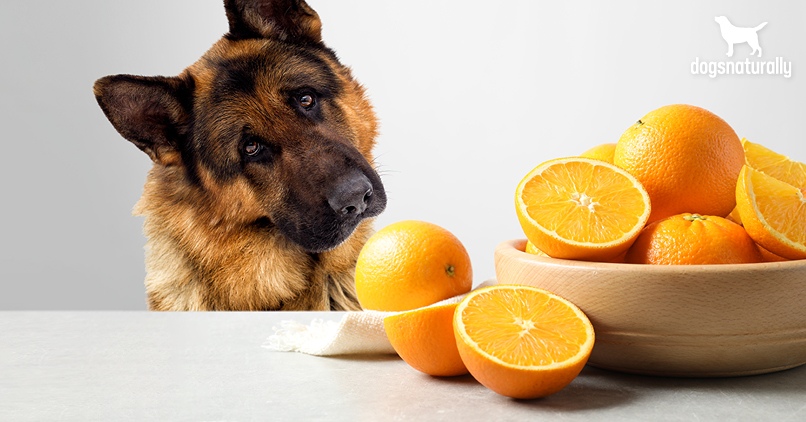Can dogs eat oranges? Yes, dogs can safely eat this citrus fruit in moderation. There are even times when the vitamin C from oranges can give your dog an extra boost.
But that doesn’t automatically make oranges good for dogs.
I’ll tell you about some of the health benefits of oranges for dogs today. But I’ll also mention a few cautions you as pet parents should take before you share oranges or other citrus fruits with your dog.
3 Benefits Of Vitamin C
Vitamin C plays many roles. It’s needed for …
- Proper tissue growth and repair
- The formation of calcium and iron
- Strengthening the immune system
- Adrenal gland function
While a healthy dog shouldn’t need vitamin C added to his dish … there are times when a bit of extra vitamin C could be a good thing.
1. To Reduce Free Radicals
Vitamin C is an antioxidant. It improves your dog’s immune system by scavenging free radicals.
Free radicals are unstable molecules with unpaired electrons. To make themselves whole again, they’ll steal electrons from other molecules. This creates more free radicals which damages cells, DNA and proteins in the process.
And damaged cells can lead to premature aging and chronic health problems like …
- Cancer
- Inflammatory disease
- Autoimmune disorders
- Arthritis
- Heart disease
- Cataracts
Some free radicals are a byproduct of metabolism. And that’s okay … your dog needs a healthy balance of free radicals.
But free radicals are also created by toxins in your dog’s environment …
- Secondhand smoke
- Pesticides
- Pollution
- Frequencies from cell towers
- Processed foods
To keep the number of free radicals in check, the body requires antioxidants.
Antioxidants stabilize free radicals, so they no longer need to attack healthy cells. And that stops the chain reaction that leads to chronic disease.
2. To Control The Allergic Response
Your dog’s body is full of mast cells that act as the first line of defense for your dog’s healthy immune system too.
When they sense an invader, they send out chemical mediators …
- Cytokines
- Histamines
- Granulocyte
- Leukotrienes
- Heparin
This allows your dog’s body to heal the injury or infection that caused the immune response in the first place.
When your dog suffers from allergies, his body’s sensitive to certain substances … pollen, food, grass. It treats the substance like an invader and tries to destroy it. This causes his mast cells to release their chemicals.
Vitamin C’s an anti-allergy vitamin that stabilizes the mast cells. This means they aren’t as likely to release those chemicals.
3. When Your Dog’s Stressed
When your dog experiences emotional or physical stress … his body redirects resources to feed stress hormones. This includes vitamin C, along with B5 and zinc.
If these resources get redirected to manage stress … there aren’t enough nutrients left for other processes. And that means your dog may need a boost in vitamin C to make sure his immune system stays strong.
Common sources of physical and emotional stress for dogs can be …
- Excessive exercise
- Unfamiliar environments
- Travel
- Vaccines
- Medications
- Poor nutrition or a change in foods
- New routines
- Moving
- Loud noises
If you feel like your dog’s a bit more stressed than usual, it may be a good idea to give him some extra vitamin C.
And, when you do that, it’s much better to give it as food, instead of out of a bottle. Most vitamin C you buy at health stores come from ascorbic acid. And that means it’s synthetic and produced in a lab.
Some brands source their vitamin C from whole foods. Look for those if you want to use a supplement.
But otherwise, oranges are a good way to get some natural vitamin C into your dog.
How To Safely Share Oranges With Your Dog
Oranges are safe for dogs but … there are three things to consider before you feed your dog some orange.
Oranges Are A Sweet Treat
Oranges contain a lot of natural sugars and are very acidic. They can be a healthy snack, but only in moderation. If your dog eats too much, it could upset his stomach.
The first time your dog has oranges, start slow and stick to small quantities to see how he reacts.
If he does well, you can give him a bit more. But be sure to limit it to a treat sized portion … a segment or two is plenty for a large dog.
Seeds And Peels Can Cause Obstructions
Orange seeds could cause a gastrointestinal blockage. So you don’t want to give any to your dog.
As for orange peels, they’re also difficult for most dogs to digest. They can also contain pesticides or other chemicals. This makes them a potential health risk. So there’s no reason to let your dog eat them.
Even if you try to safely feed your dog oranges, it’s best to feed orange slices without any orange peel.
In other words? Stick to feeding just the orange flesh as a healthy treat.
If your dog does eat orange peels or seeds by accident, look for these symptoms of a bowel obstruction …
- Loss of appetite
- Vomiting
- Diarrhea
- Less responsive
- Tacky or sticky gums from dehydration
- Belly is sensitive to touch
- Bloat
Some Dogs Shouldn’t Eat Oranges
If your dog’s diabetic or overweight … it’s best to steer clear of oranges.
Oranges have a moderate to high sugar content.
It could cause an unnecessary spike in dogs with diabetes … or increase the caloric intake for overweight dogs.
And while puppies can eat oranges, their stomachs are more sensitive. So be cautious about how much you give them or better yet … consider a different treat.
Can Dogs Have Orange Juice?
If dogs can have oranges, does that mean they can also have orange juice? Can dogs eat orange peels too? The answer to both questions is no. You should avoid feeding your dog orange peels or orange juice.
Orange juice isn’t toxic, but it’s also not the same as feeding your dog a citrus fruit. Juice isn’t recommended for dogs due to the high sugar content and acidity, which can upset their digestive system.
How Many Oranges Can Dogs Eat?
How many oranges your dogs can eat depends on his size and breed.
Larger breeds such as Huskies or German Shepherds could enjoy two or three orange slices without any adverse effects. But small dogs like Yorkies or Pomeranians could have digestive discomfort from the same amount.This is because that same quantity of orange is a much larger fraction of their daily recommended caloric and sugar intake.
The general rule is that treats (like oranges for dogs) shouldn’t be more than 10% of your dog’s total daily calorie intake. So even if your dog likes eating oranges, you need to balance it with regular meals.
Here are some more specific guidelines you can use to figure out how many oranges to include in your pup’s diet:
- Extra-small dog (2–20 pounds) = ½ an orange slice (Suitable for: Yorkies, Chihuahuas, Pomeranians, Pugs)
- Small dog (21–30 pounds) = ½ an orange slice (Suitable for: Basenjis, Beagles, Miniature American Shepherds)
- Medium dog (31–50 pounds) = 1 orange slice (Suitable for: Basset Hounds, Border Collies, Australian Cattle Dogs)
- Large dog (51–90 pounds) = 1 to 2 orange slices (Suitable for: Pit Bulls, German Shepherds, Labrador Retrievers, Australian Shepherds)
- Extra-large dog (91+ pounds) = 2 orange slices (Suitable for: Newfoundlands, Bernese Mountain Dogs, Saint Bernards, Great Pyrenees)
So, Can Dogs Eat Oranges?
Yes. Dogs can eat oranges. As well as tangerines, clementines and mandarins. They can also have other citrus fruits like lemons, limes or grapefruit.
While it’s theoretically possible to include these in your dog’s diet, that doesn’t mean he’ll actually eat them.
Some dogs don’t like the taste of citrus fruits. So, if you give your dog a piece of orange and he doesn’t show interest … don’t worry.
There are other healthy options that he may like more.
FAQ
Can dogs eat mandarin oranges?: Yes, dogs can eat mandarin oranges in small quantities, as they’re not toxic and can provide vitamin C. But they should be peeled and seedless to avoid digestive issues.
Are oranges toxic for dogs?: No, oranges aren’t toxic for dogs, but they still should be given in moderation due to their high natural sugar content and acidity.
What other fruits, can a dog not have?: Dogs should not eat grapes, raisins, cherries, and avocados, as these fruits can be toxic or harmful to them.
Can dogs eat satsumas?: Yes, dogs can eat satsumas in small amounts. But like other citrus fruits, they should be peeled and seedless to prevent any digestive discomfort.















